|
Expand All
|
|
|
|
Station was established in 1977 with farm area of 10.4 ha and is located at Thrissur of Kerala (India). Geographical co-ordinates of the station: Latitude (10°33'09.6"N); Longitude (76°16'38.6"E); Altitude (46 m MSL). Station is 13 km away from Thrissur Railway Station and 55 km away from Kochi International Airport.
Mandate: Augmentation, Characterisation, Evaluation, Maintenance, Regeneration, Conservation, Documentation and Distribution of Plant Genetic Resources in Southern India including Goa and Andaman & Nicobar Islands.
- Plant Exploration and Germplasm Collection
- Augmentation and Acclimatization of Crops New to the Region
- Characterization, Evaluation and Documentation
- Regeneration, Maintenance and Conservation
- Germplasm supply to user agencies on Material Transfer Agreement (MTA)
Agricultural Crops: Rice, Horsegram, Sesame and wild species of Cajanus, Oryza, Sesamum and Vigna
Horticultural Crops: Fruits: Jackfruit, Mango, Minor fruits; Vegetables: Ash gourd, Bitter gourd, Leafy amaranth, Okra, Snake gourd, Pumpkin and wild species of Abelmoschus, Cucumis, Momordica, Solanum and Trichosanthes; Spices: Black pepper, Kokum, Malabar tamarind, Curry leaf and wild species of Cinnamomum, Curcuma, Piper and Zingiber; Tubers: Taro, greater yam, elephant foot yam, lesser yam, Chinese potato, minor tubers and wild species of Dioscorea and Amorphophallus; Medicinal & Aromatic Plants: Alpinia calcarata, A. galanga, Bacopa monnieri, Kaempferia galanga, Piper longum
Jurisdiction: States of Kerala, Karnataka, Tamil Nadu, Goa and Union Territories of Puducherry, Lakshadweep and Andaman & Nicobar Islands.
|
|
|
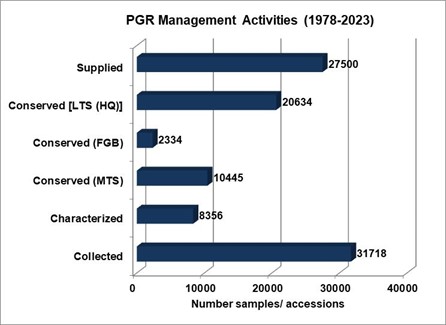
- Total of 279 exploration missions made (1978-2023)
- Special exploration and collection mission to new areas including A&N Islands
- 17 new taxa described and reported new distribution record of 6 CWRs in India.
- Wide hybridisation and genetic enhancement carried out in okra for development of YVMV tolerant pre-breeding lines
- A network of custodian farmers identified across Kerala, cultivating and maintaining landrace diversity in rice, taro, greater yam, mango, jackfruit, banana, vegetables, native and exotic fruit trees and medicinal plants
- Seven varieties of vegetables released by Kerala Agricultural University (KAU) based on germplasm supplied
- Twelve accessions with unique traits registered as genetic stock under PGRC of ICAR
- Total of 498 publications made including 218 research papers
|
|
|
|
|
|
|
|
The “Best Stall Award” for Station in National Biodiversity Congress & Expo – 2017 organized by Kerala State Biodiversity Board (KSBB), Govt. of Kerala on 22-26th February, 2017 at Thiruvananthapuram.
|
|
|
|
A. Germplasm Exploration and Collection: From 1978-2023, a total of 279 exploration missions were undertaken based on the crop priorities fixed from time to time, independently or in collaboration with ICAR/ SAU/ International institutes. Ten exploration trips in collaboration with International Institutes namely ICRISAT (3 trips), CSIRO (1), IRRI (2) and IBPGR (4) were carried out. The other national collaborators (ICAR institutes/ SAUs) were ANGRAU, CIARI, CPCRI, CTCRI, IIHR, IIPR, IISR, KAU, NRCB, SBI, TNAU and UAS-B. So far, 31718 accessions/samples were collected through these missions.
Revival of species/ landraces under near extinction: Two crop landraces almost extinct were revived by our station’s efforts (Uralimathan in pumpkin, Mullan vellari in cucumber).
New Taxa Described/ New Reports: Seventeen new taxa namely, Abelmoschus enbeepeegearensis, A. pungens var. mizoramensis, Begonia bachulkarii, Curcuma amada var. glabra, C. karnatakensis, C. kudagensis, C. longa var. vanaharidra, C. malabarica, C. nilamburensis, C. thalakaveriensis, C. vellanikkarensis, Momordica cochinchinensis subsp. andamanica, M. sahyadrica, M. sahyadrica subsp. anamalayana, Piper pseudonigrum, Trichosanthes dunniana subsp. clarkei and Vigna konkanensis have been described. Six reports of extended distribution of the species Curcuma albiflora, C. oligantha, Dioscorea piscatorum, Vigna dalzelliana, Cucumis muriculatus and Ziziphus subquinquenervia and resurrection of Cucumis muriculatus from C. hystrix were also made.
Unique collections made: Saline tolerant ‘Pokkali’ rice (37 landraces); Upland direct seeded rice (42 landraces); Variability in cultivated, wild and semi-domesticated bitter gourds (64 acc.); Poly-embryonic mango landraces (101 acc.); Medicinal ash gourd ‘Neykumbalam’; multi-cut and dual purpose leafy amaranth; Carotenoid rich cucumber accessions; Potential vegetables like Sweet gourd (Momordica cochinchinensis) and Teasel gourd (Momordica subangulata subsp. renigera) from North East India and A&N Islands; Kokum (Garcinia indica) - a potential tree-borne seed oil and multi-purpose fruit (54 acc.); Malabar tamarind (Garcinia gummi-gutta) – a potential condiment/ raw material for pharmaceutical industry (145 acc.); Sesamum prostratum – a Critically Endangered wild relative of sesame; Crop wild relatives in the genera Abelmoschus (125 acc./10 taxa), Amorphophallus (17/4), Artocarpus (23/12), Cucumis (24/8), Curcuma (89/19), Dioscorea (70/12), Garcinia (43/18), Mangifera (8/4), Momordica (316/6), Oryza (1/1), Piper (96/15), Sesamum (64/4), Solanum (153/14), Vigna (420/21) and Zingiber (21/6).
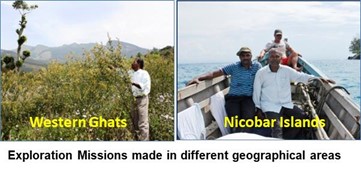 New Areas Explored: During last 10 years, several areas were systematically explored for the first time namely Swarajdweep, Little Andaman, Katchal, Kamorta, North Andaman, Middle Andaman and South Andaman in Andaman & Nicobar Islands; Muthikulam forest of Palakkad dt., Kerala; three inhabited islands of Lakshadweep; Indira Gandhi Wild Life Sanctuary in Tamil Nadu and Parambikulam Wild Life Sanctuary in Kerala and Yelagiri and Javadu Hills of Tamil Nadu; Thengumarahada village in Sathyamangalam forest under Nilgiris district, Tamil Nadu; Valmiki Tiger Reserve in Bihar; Myanmar bordering areas in Arunachal Pradesh, Nagaland, Manipur and Mizoram; North Sikkim in Sikkim.
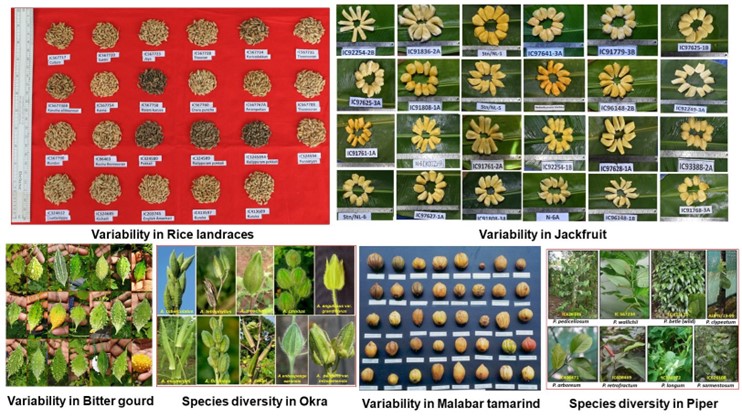 B. Germplasm Characterisation and Evaluation: So far, 6600 accessions of field crops, 1463 of horticultural crops and 293 accessions of wild relatives of crop plants were characterised. Number of accessions characterized in major crops as follows: rice (2500), green gram (400), black gram (100), horse gram (1800); sesame (308), yard long bean (120), okra (1328), chinese spinach (60), cucumber (50) etc.
Promising accessions identified:
| Crop |
Traits |
Accessions identified |
| Yard long bean |
Single pod weight (>15g) |
IC622559, IC622565, IC622573, IC622575 |
| Green gram |
Uniform maturity |
IC641257, IC629436, IC641292, IC641291 |
| Horse gram |
100-Seed weight (g) |
IC15724 (5.81), IC360587 (5.64), IC360588 (5.54), IC372629 (5.51), IC361192 (5.44) |
| Kokum |
Early season bearing |
IC136687-3, IC552528-1, IC552528-3 |
| Malabar tamarind |
Year around fruiting |
IC244101-2 |
| Offseason bearing |
IC244113-1 |
| Bitter gourd |
Fruit length (>30 cm) |
IC470535 (34), IC264770 (34) |
| Cucumber |
Carotenoid content (µg/100 mg) |
IC644584 (48.3) |
| Okra |
Ridge-less fruits |
EC901970, EC901971, EC901982 |
| Taro |
Anthocyanin content (mg/100g) |
IC636544 (22.7), IC634540 (16.5) |
| Jack fruit |
Good fruit quality |
IC645894, IC91806-3A, IC645404, IC97628-1A, IC91761-2A |
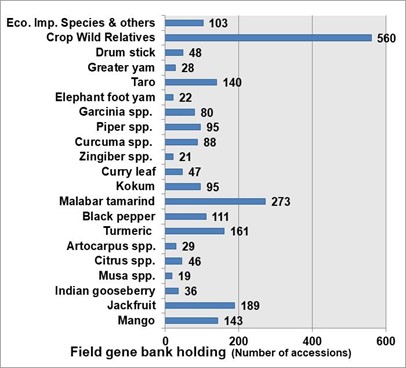 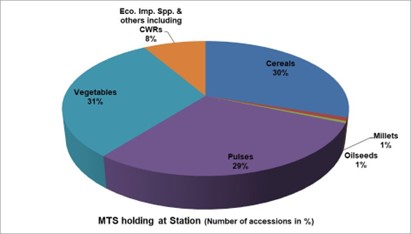 C. Germplasm Conservation: A total of 13079 accessions belonging to different crops and their wild relatives are maintained [field gene bank (2334 accessions; 255 genera; 450 species) and medium-term storage (10445 accessions; 110 species)] and 20634 accessions were sent to National Gene Bank for long-term storage. MTS holding comprises cereals (3123), millets (85), oilseed (48), pulses (3040), vegetables (3221) and other economically important species (EIS) including crop wild relatives (928).
D. Germplasm Exchange:
Germplasm transfer to crop-based institutes/ National Active Germplasm Sites (NAGS): In all, 2044 accessions of different perennial horticultural crops were transferred to > 50 crop-based institutes/ NAG sites such as CISH, Lucknow (67); CTCRI, Thiruvananthapuram (1097); IIHR, Bengaluru (28); IISR, Kozhikode (556); and NRCB, Tiruchirappalli (291).
Supply to user agencies: Under material transfer agreement (MTA), supplied 24156 samples to various user agencies comprising ICAR institutes (6670), SAUs (14369) and other institutions (3117).
Supply for multi-location evaluation: Supplied 1300 accessions comprising 800 of horsegram to three institutions under the National Network Research Project on Arid Legumes and 500 of okra to Indian Institute of Vegetable Research, Varanasi under the All India Co-ordinated Research Project on Vegetable Crops.
E. Germplasm Utilization:
Pre-breeding in Okra: Wide hybridisation and genetic enhancement carried out in okra by developing inter specific hybrids involving eight wild Abelmoschus species for development of YVMV tolerant pre-breeding lines.
 Popularization of Teasel gourd: Teasel gourd also called ‘Kantola’ or Assam kakrol (Momordica subangulata subsp. renigera) a semi-domesticated vegetable, native to Assam, Myanmar region and cultivated commercially in Eastern and North Eastern states of India, is popularized in non-traditional area like Kerala due to its nutritional richness combined with high consumer acceptability and adaptability to humid tropical regions. Compared to its close wild relative M. diocia (spine gourd), it has bigger fruit size, extended harvest period, efficient vegetative propagation, higher yield and is more amenable to commercial cultivation. The planting material was distributed to more than 100 farmers across Kerala and disseminated the cultivation practices through various training programmes and workshops. Farmers are successfully growing the crop in their home gardens and recognized the crop as a remunerative one.
Popularization of other potential crops: Non-bitter type of Aloe vera (IC333202), Burmese fish tail palm (Caryota mitis) (IC553772) collected from Andaman Islands and Sweet gourd (Momordica cochinchinensis) were popularised among farmers/ tribal as potential vegetables/ economic plants for food and livelihood security.
Varieties released using our germplasm: Kerala Agricultural University (KAU) has released seven varieties using germplasm obtained from NBPGR Regional Station, Thrissur.
| Crop/Scientific name |
Variety (Year of release) |
Breeding type/ Parentage |
Specific traits |
| Brinjal (Solanum melongena) |
Neelima
(1998) |
Hybrid between Surya’ x NIC014090 |
High yield with resistant to bacterial wilt (Ralstonia solanacearum) |
| Chinese potato (Plectranthus rotundifolius) |
Nidhi
(2000) |
Clonal selection from IC085708 |
High yield with large tubers; good cooking quality; short duration vegetable crop in South India |
| Greater yam (Dioscorea alata) |
Indu
(1997) |
Clonal selection from IC44209 |
Shade tolerant variety with eight months duration |
| Okra (Abelmoschus esculentus) |
Salkeerthi
(2000) |
Re-selection from IC470862 |
High yield and attractive long light-green fruits |
| Okra (Abelmoschus esculentus) |
Aruna
(2000) |
Pure line selection from IC218870 |
High yield potential, attractive colour and long fruits rich in anthocyanins |
| Okra (Abelmoschus esculentus) |
Manjima
(2007) |
Hybrid between Gowreesapattom Local x IC282257 |
High yielding (1.34kg/plant), compact, early maturing and field resistance to YVMV |
| Yard-long Bean (Vigna unguiculata subsp. sesquipedalis) |
Kairali
(2000) |
Pure line selection from IC045415 |
Field resistance to Mosaic disease |
Genetic Stocks registered: Twelve accessions with unique traits registered under the Plant Germplasm Registration Committee (PGRC) of ICAR.
- Malabar tamarind (Garcinia gummi-gutta) (INGR: 04061/2004) - IC244100-2, early bearing with higher fruit number (1496); high fresh fruit yield (104.2 kg/tree).
- Malabar tamarind (Garcinia gummi-gutta) (INGR: 04062/2004) - IC244111-1 early bearing, with higher fruit number (1470), high fresh fruit yield (99.3 kg/tree).
- Kokum (Garcinia indica) (INGR: 04063/2004) - IC136687-3, higher number of fruits (3267/year), high fruit yield (47.9 kg/year), with a TSS value of 20%.
- Dioscorea pubera (INGR08061) – IC202382, for high diosgenin content
- Dioscorea spicata (INGR08062) – IC202383, for high diosgenin content
- Dioscorea hispida (INGR08063) – IC202370, for high diosgenin content
- Dioscorea hamiltonii (INGR08064) – IC202328, for high diosgenin content
- Greater galangal (Alpinia galanga) (INGR: 08107/2008) - IC349746 contain high 1,8–cineole (72.49%); a-pinene (5.54%); a-terpineole (3.82%) and a-terpiniene-4 –ol (2.35%).
- Lesser galangal (Alpinia calcarata) (INGR: 09051/2009) - IC210421, high 1,8–cineole (13.2-30.2%); a-fenchyl acetate (26.3-38.7%).
- Black pepper (Piper nigrum) (INGR: 10065/2010) - IC266417, unique oval shaped berries.
- French bean (Phaseolus vulgaris L.) (INGR:10026/2010) - pole type with long pods (23-25 cm) and dual purpose (vegetable as well as pulse).
- Ornamental okra (INGR: 16036/2017) - IC599974, F1 hybrid of musk mallow (Abelmoschus moschatus x A. sagittifolius) an ornamental plant with perennation and bright red flower.
 Field Days and Biodiversity Fairs: 22 field day/ biodiversity appreciation days, 4 biodiversity fairs and 7 grass-root level trainings were conducted for showcasing the diversity/ variability in the germplasm holdings and creating PGR awareness among farmers. Further, PGR activities of the station were demonstrated to the public by our staff in six different exhibitions organized by Malabar Botanic Garden, Kerala Agricultural University, Kerala State Biodiversity Board, Farm Information Bureau, Kerala Science Congress etc.
Recent Initiatives:
Ex-situ repository for economically important crops from A&N Islands: An ex-situ repository has been developed for conserving the economically important CWR’s collected from A&N Islands, where 218 accessions of 117 taxa are maintained in the field genebank. They include Garcinia speciosa, Nicobar endemic palms - Rhopaloblaste augusta, Bentinckia nicobarica, different species of Artocarpus, Mangifera, Garcinia, Piper, Zingiber, etc. which are only available in A&N Islands.
Custodian Farmer Network database: A network of custodian farmers was identified across Kerala for crop specific diversity, who are cultivating and maintaining landrace/ primitive cultivars of any particular crop. In this line, a database of 72 custodian farmer conservator of Kerala maintaining landraces of rice, yard long bean, tubers, black pepper, turmeric, ginger, jackfruit, banana, mango was developed and it consists of the name, address and contact number of farmers, list of crops/species conserved by them.
On-farm conservation programme:
Mango: Indigenous mango cultivars collected as scions from Kannapuram village of Kannur recognized as Mango Heritage Village by Kerala State Biodiversity Board, are being conserved successfully at three sites namely Kollengode, Palakkad District (107 grafts), Kalarkode, Alappuzha (69 grafts) and Thrissur (40 grafts).
Brinjal: Vazhuthana Nivedyam (Brinjal nivedyam) – a unique offering to the deity of Koodalmanikam temple, is prepared using brinjal local landraces supplied. On-farm conservation cum demonstration of brinjal diversity comprising 39 accessions was organised at Koodalmanikyam Devaswom compound, Irinjalakuda in collaboration with KAU, Thrissur and Dept. of Agriculture, Govt. of Kerala.
Publications:
A total of 498 research publications made.
| Research papers |
218 |
| Seminar/Symposium papers |
118 |
| Book chapters |
38 |
| Books |
08 |
| Booklets |
11 |
| Germplasm Catalogues/ Scientific Monographs |
09 |
| Technical Bulletins |
13 |
| Popular articles/ e-publications |
83 |
|
|
|
|
|
|
|
|
|
|
|
|
|
|
2.
|
Joseph John K, K Pradheep, M Abdul Nizar, VA Muhammed Nissar, MV Krishnaraj, M Latha, A Suma, LK Bharathi, R Asokan Nair and KV Bhat (2018). Taxonomy, Diversity and Distribution of the Genus Cucumis L. in India. Indian J. Plant Genet. Resour., 31 (1): 78-88
|
|
|
|
|
|
|
|
|
|
|
|
|
|
Inhouse Projects
|
| Programme | Project Title | Leader and Associates | Project Code |
|
01.00
|
Augmentation, Characterisation, Evaluation, Maintenance, Regeneration, Conservation, Documentation and Distribution of Plant Genetic Resources in Southern India including Goa and Andaman & Nicobar Islands. (Institute Projects: 03)
|
|
PGR/GEV-BUR-THR-01.00
|
|
01.01
|
Plant Genetic Resources Management of field crops and their wild relatives
|
Mr M Latha, K. Pradheep, PP Thirumalaisamy, K Venkatesan, Suma A and A Indiradevi
|
PGR/DGE-BUR-THR-01.01
|
|
01.02
|
Plant Genetic Resources Management of vegetables, tropical tubers and their wild relatives
|
Dr Suma A, M Latha, K. Pradheep, PP Thirumalaisamy, K Venkatesan and A Indiradevi
|
PGR/DGE-BUR-THR-01.02
|
|
01.03
|
Plant Genetic Resources Management of spices, fruit crops and their wild relatives, medicinal and other economic plants
|
K. Pradheep, M Latha, PP Thirumalaisamy, K Venkatesan, Suma A, and A Indiradevi
|
PGR/DGE- BUR-THR-01.03
|
|
|
|
Externally Funded Projects
|
| Programme | Project Title | Funding Agency | Principle Investigator | Date of Start | Date of Termination | Budget (Lakhs) | Project Code |
|
01
|
Mainstreaming of Sesame germplasm for productivity enhancement through genomics assisted core development and trait discovery (Subproject 6; Component 1)
|
DBT
|
K Pradheep
|
February 2020
|
February 2025
|
46.96
|
1012162
|
|
03
|
Generating Genomic Resources for facilitating genetic enhancement on selective Vigna species and Horsegram
|
DBT
|
Dhammaprakash Wankhede
|
April 2019
|
March 2025
|
533.84
|
1010668
|
|
04
|
Evaluation of wild species and landraces for their utilization (Component-III)
|
CRP-on Agrobiodiversity project
|
Suma A
|
August 2021
|
August 2026
|
3.43
|
1010253
|
|
05
|
Momordica A detailed foodomics study for food authentication and exploration of nutraceutical potential
|
NASF Project
|
Manjusha Verma
|
August 2022
|
August 2025
|
71.06
|
1013764
|
|
06
|
Cryobiotechnological approaches for genetic resources conservation and creation of base germplasm collection of Indian Piper sp.
|
DST
|
Era Vaidya Malhotra
|
August 2016
|
August 2025
|
41.82
|
1014180
|
|
|
|
|
|
|
|
|
|
Dr. K. Pradheep, Officer-In-Charge
|
|
ICAR-NBPGR RS, Thrissur
|
|
Phone: +91 9968691977, +91 9968610054
|
|
Email: k.pradheep(AT)icar.gov.in, hortpradheep(AT)gmail.com
|
|
|
|
|
|
|
|
Dr. M Latha, Principal Scientist
|
|
ICAR-NBPGR RS, Thrissur
|
|
Phone: +91 9995546541
|
|
Email: M.Latha(AT)icar.gov.in, lajay5(AT)gmail.com
|
|
|
|
|
|
|
|
Dr. Venkatesan K, Senior Scientist
|
|
ICAR-NBPGR RS, Thrissur
|
|
Phone: +91 8742804779
|
|
Email: Venkatesan.K(AT)icar.gov.in, venkipgr08(AT)gmail.com
|
|
|
|
|
|
|
|
Dr. Thirumalaisamy PP, Senior Scientist
|
|
ICAR-NBPGR RS, Thrissur
|
|
Phone: +91 9925324496
|
|
Email: Thirumalaisamy.P(AT)icar.gov.in, thirumalaisamypp(AT)yahoo.co.in
|
|
|
|
|
|
|
|
Dr. Suma A, Scientist
|
|
ICAR-NBPGR RS, Thrissur
|
|
Phone: +91 9446125841
|
|
Email: suma.a(AT)icar.gov.in, sumaagri(AT)gmail.com
|
|
|
|
|
|
|
|
Mrs. A Indiradevi , Chief Technical Officer
|
|
ICAR-NBPGR RS, Thrissur
|
|
Phone: +91 9495852362
|
|
Email: A.Indradevi(AT)icar.gov.in
|
|
|
|
|
|
|
|
Ms. Safna K, Technical Assistant
|
|
ICAR-NBPGR RS, Thrissur
|
|
Phone: +91 8285820808
|
|
Email: Safna.K(AT)icar.gov.in, safushad(AT)gmail.com
|
|
|
|
|
|
|
|
Mrs. Anitha Komvalappil, Skilled Supporting Staff SSS4
|
|
ICAR-NBPGR RS, Thrissur
|
|
Phone: +91 9349657244
|
|
Email: anitha.komvalappil(AT)icar.gov.in
|
|
|
|
|
|
|
|
|
|
|
|
|
|
|